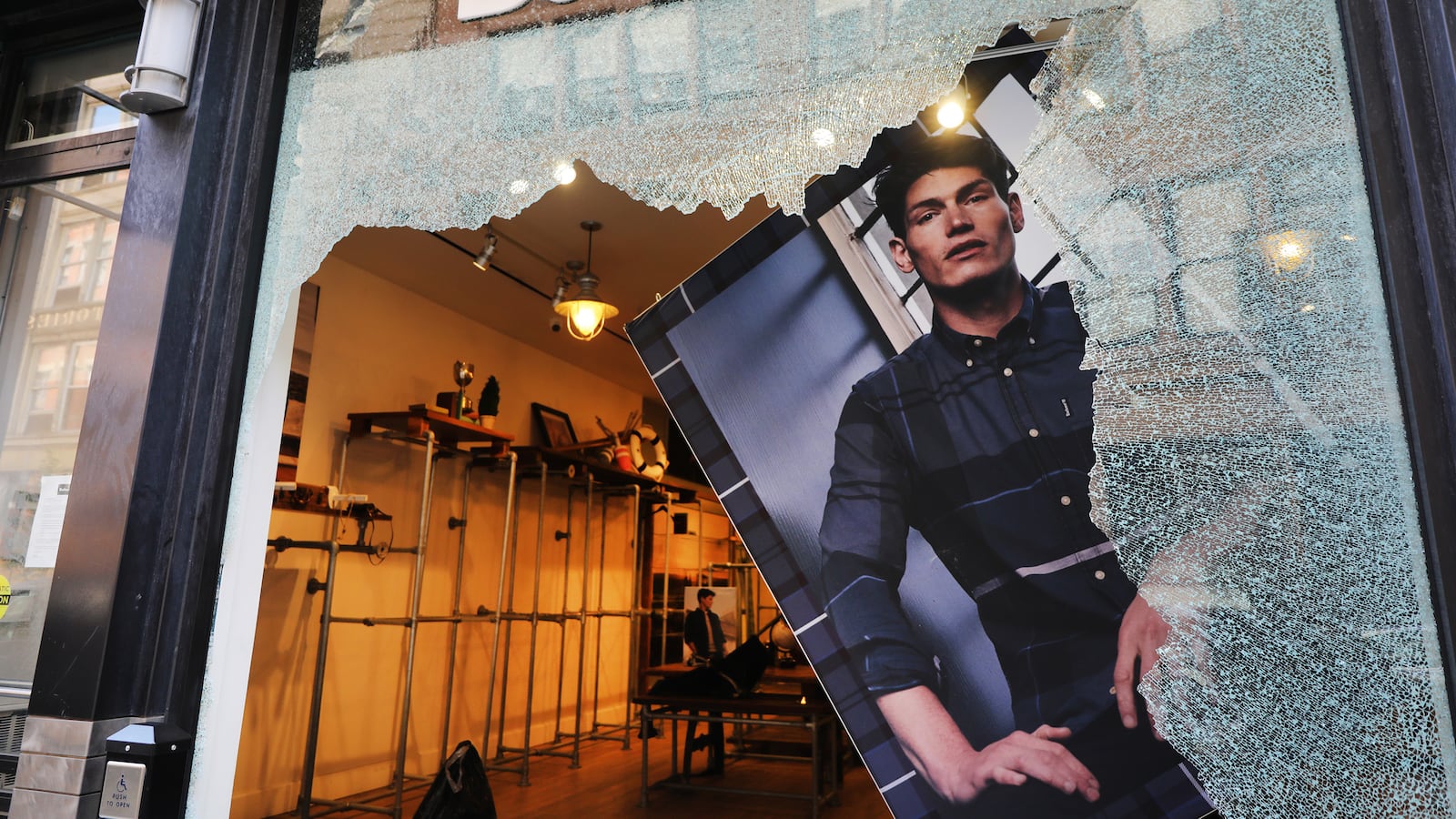When the coronavirus pandemic began, companies started running ads to assure us that they cared. YouTube compilations spliced together messages from Budweiser, Uber, and Walmart promising that we were all in these uncertain times together, and it was downright heroic to pay your Verizon bill.
After the murder of George Floyd prompted nationwide anti-racist protests, Instagram again filled with messages from brands. These posts and stories featured somber but stylish graphic design, with platitudes about peace and justice written in millennial-friendly serif fonts.
That kind of post is so ubiquitous that it has been parodied in a spot-on meme circulating Twitter on Monday that skewers such corporate-speak. “We at [Brand] are committed to fighting injustice by posting images to Twitter that express our commitment to injustice,” it reads. “To that end, we offer this solemn white-on-black .jpeg that expresses vague solidarity with the Black community, but will quietly elide the specifics of what is wrong, what needs to change, or in what ways we will do anything about it.”
“The inequitable and brutal treatment of Black people must stop,” Shopbop, owned by Amazon, posted. “Shopbop stands in solidarity with the Black community—our employees, our customers, and our partners—in the fight against systemic racism and injustice.” No information was provided on how Shopbop plans to implement such a vague pledge.
The retailer’s message was written in white font over a black background. Using a very similar layout, L’Oréal Paris issued a statement that read, “Speaking Out is Worth It.” (The brand will also donate $150,000 to the NAACP”)
“FUCK YOU,” replied Munroe Bergdorf, a black trans model fired by the company in 2017 after speaking out against racism in the wake of the Charlottesville violence.
As protests from Minneapolis spilled into New York streets on Friday, when 200 people were arrested in Brooklyn and scenes of brutality against protesters and journalists were broadcast live, Louis Vuitton launched a new handbag. The luxury brand only noted the unrest Sunday evening, posting a video with the caption, “MAKE A CHANGE. FREEDOM FROM RACISM TOWARDS PEACE TOGETHER.”
Essie, which sells nail polish, was also unclear in its posturing. “four years ago, we founded a day to celebrate color,” a statement said in lower case font. “today, we stand in solidarity and know that our colors go beyond nail polish. we stand for equality, inclusivity, and connecting the world through color—today and every day.”
“So are you donating?” commenters asked.
This propelled an additional statement, written in the same type but over a black background instead of a gray one. It read, “thank you to our loyal followers for speaking up. we hear you, and agree that our language of solidarity to the black community was not strong enough. #blacklivesmatter.” (The brand also allocated an unspecified donation to the NAACP.)
Kenneth Cole posted a photo of children’s arms, each one a differing skin tone. “We belong to the same color palette,” the designer tweeted, adding the hashtag #BlacklivesMaters.
When Valerie Eguavoen, a social justice advocate from Durham, North Carolina, noticed that Lane Bryant had not posted in solidarity with Black Lives Matter, she commented on the brand’s last Instagram post. It featured a photo of the company’s “social media captain,” Dominique, wearing a top and jeans from the line.
“Hey Dominique, can you let corporate know that the country is on fire and Black Lives Matter? Thanks,” Eguavoen wrote. Later, the Lane Bryant account threw up a statement pledging a donation to the NAACP. (The team did not respond to a request for comment.)
“There is no news station that you can turn to right now where you’re not seeing what’s happening,” Eguavoen told The Daily Beast. “There’s no Twitter feed that won’t show what’s going on in the streets in response to brutality against black lives in this country. To scroll through your feed and see all that, and then to stumble upon a post from a brand you support that is showing the latest outfit on their associate, that is very disheartening.”
As Vogue noted today, many smaller companies donating to Black Lives Matter and various bail funds were already in the throes of financial turmoil due to the coronavirus.
So, moves by the likes of Glossier ($500,000 to various organizations, another $500,000 for grants to black-owned companies) are more than gestural. But as my Google promotion inbox fills with subject lines like “A Heartfelt Message,” what should be solidarity messages read more like advertising copy.
“It took a lot of people calling brands out to make them start posting,” Eguavoen added. “We really have to think about why it takes us asking for acknowledgement to be acknowledged. We’ve seen people post in the past two or three days after being called out, but George Floyd’s murder happened seven days ago. Breonna Taylor [died] on March 13.”
Diarrha N’Diaye is a social strategy and brand consultant who works in the beauty industry. This weekend, she saw the organic makeup company RMS Beauty post about a limited edition probiotic release while ignoring the Black Lives Matter movement.
“Your Black and Brown customers are tired, hurting and devastated,” N’Diaye wrote in a comment. “We’re waiting for you to SHOW UP.”
Rose-Marie Swift, the makeup artist behind the brand, replied, “In all fairness, we did not know there is an expectation [sic] date for showing support and our team will be in the office Monday 9:00 est. We feel the exact same way as you all do. All love no hate.” It was punctuated by a white thumbs up and heart-eye emoji.
The exchange was swiftly called out on various beauty industry social media accounts. Within the next two days, the brand would post an apology for the statement and additional cartoon of a white and black person embracing. A tiny cursive “Black Lives Matter” was placed underneath. (Representatives for RMS Beauty did not respond to The Daily Beast’s request for comment.)
“As an influencer who has posted [RMS Beauty] looks, I felt compelled to say, ‘I would love to see what you can do to see us, because we always see you,’” N’Diaye said. “The response is definitely a disappointment.”
“I actually enjoy going to Sephora and playing and applying makeup to my skin, and I feel seen when the colors pop. I’m genuinely happy,” N’Diaye added. “Wow, this brand sees my existence and values me as a customer. But you can’t bet on the bond when it’s not both ways.”
She said that she “does not believe in cancel culture”. “But I do believe in the power of the dollar and the influence that we have,” N’Diaye said. “If a brand does not do the work, they don’t get the merit. For me, merit means dollars. We can’t give you that currency and power if you haven’t done the work.”
N’Diaye likened a brand’s Instagram activism to cleaning a broken iPhone with a Lysol wipe. “The surface might be fine, but fix the entire phone,” she said. That change begins “from the top down,” she said.
“The funniest part is, you don’t lose anything from being a diverse company,” N’Diaye said. “When you create a safe space, anyone can take part. You’ll make more money as a brand with that purchasing power.”
Aurora James, a designer and creative director of the shoe label Brother Vellies, created the “15 Percent Pledge,” which calls on major retailers to give that amount of shelf space to black-owned businesses. (Fifteen percent of the United States population is black.)
She’s calling on Whole Foods, Target, Walmart, Sephora, Saks, Net-a-Porter, Barnes and Noble, and Home Depot to take part. James hopes her 15 Percent Pledge will “deliver more money to Black communities.”
“I think now what we’re seeing is a lot of brands feel like they have to post something because they don’t want to get called out for not posting something,” James said. “A lot of what they’re posting is vague. Maybe they’re making a donation. Now I’m at that point where that needs to be followed up with the question: How much?”
There is nothing wrong with a brand clarifying their morals and values, but James wonders what more can be done. “I’m definitely a ‘Yes, and’ person,” she said. “Sure, maybe you posted something that was a repost of something you saw that resonated with you. But I also want to hear from those companies: What real change are you making? Are the people in your design team, in your office, in your C-Suite people of color?”
Sherri Williams, PhD, an assistant professor in race, media, and communication at American University, prefers to call large fashion and beauty brands what they are—corporations.
“That’s an important distinction to make,” Professor Williams said. “Corporations yield a lot of financial and political power.. Corporations have the ability to effect policy change.” But that change won’t come with a mere Instagram post.
The current protests also intersect with June, which is Pride Month. Professor Williams noted that brands often promote LGBTQ causes during this time, but ignore the issue for the rest of the year. She imagines brands will do the same thing with Black Lives Matter.
“We’ve started to see the commodification of LGBTQ individuals by corporations,” Professor Williams said. “This one month, they’ll support them, attend parades and events. But after that, where are these companies? That’s my question right now during this uprising. We see social media posts, but once protesters and organizers shift attention from the streets and work in other ways, where will these companies be?”






